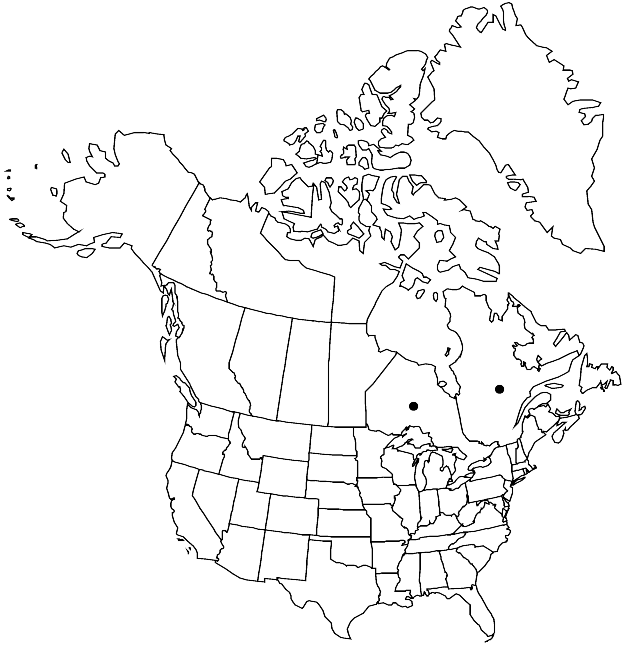Difference between revisions of "Salix euxina"
Taxon 58: 1345. 2009.
FNA>Volume Importer |
imported>Volume Importer |
||
| (6 intermediate revisions by 2 users not shown) | |||
| Line 12: | Line 12: | ||
|name=Salix fragilis var. sphaerica | |name=Salix fragilis var. sphaerica | ||
|authority=Hryniewiecki | |authority=Hryniewiecki | ||
| + | |rank=variety | ||
}} | }} | ||
|hierarchy=Salicaceae;Salix;Salix subg. Salix;Salix sect. Salix;Salix euxina | |hierarchy=Salicaceae;Salix;Salix subg. Salix;Salix sect. Salix;Salix euxina | ||
| Line 26: | Line 27: | ||
|habitat=Cultivated or riparian | |habitat=Cultivated or riparian | ||
|distribution=Ont.;Que.;n;nw Asia;introduced also in Europe. | |distribution=Ont.;Que.;n;nw Asia;introduced also in Europe. | ||
| − | |discussion=<p>Distribution of Salix euxina (formerly S. fragilis) in the flora area is uncertain. It may occur throughout southern Canada and the United States; often known as the cultivar “Bullata,” it rarely escapes. Salix euxina is native to the northern Black Sea and the Transcaucausian regions.</p> | + | |introduced=true |
| + | |discussion=<p>Distribution of <i>Salix euxina</i> (formerly <i>S. fragilis</i>) in the flora area is uncertain. It may occur throughout southern Canada and the United States; often known as the cultivar “Bullata,” it rarely escapes. <i>Salix euxina</i> is native to the northern Black Sea and the Transcaucausian regions.</p> | ||
|tables= | |tables= | ||
|references= | |references= | ||
| Line 35: | Line 37: | ||
-->{{#Taxon: | -->{{#Taxon: | ||
name=Salix euxina | name=Salix euxina | ||
| − | |||
|authority=I. V. Belyaeva | |authority=I. V. Belyaeva | ||
|rank=species | |rank=species | ||
| Line 50: | Line 51: | ||
|publication year=2009 | |publication year=2009 | ||
|special status= | |special status= | ||
| − | |source xml=https:// | + | |source xml=https://bitbucket.org/aafc-mbb/fna-data-curation/src/2e0870ddd59836b60bcf96646a41e87ea5a5943a/coarse_grained_fna_xml/V7/V7_32.xml |
|genus=Salix | |genus=Salix | ||
|subgenus=Salix subg. Salix | |subgenus=Salix subg. Salix | ||
Latest revision as of 22:32, 5 November 2020
Trees, 6–18 m. Stems: branches highly brittle at base, yellow-green, yellow-brown, or gray-brown, (highly glossy), glabrous; branchlets yellow-green, yellow-brown, or red-brown, (highly glossy), glabrous. Leaves: stipules rudimentary on early ones, rudimentary or foliaceous on late ones, (early deciduous to marcescent), apex acuminate or acute; petiole deeply grooved adaxially (margins usually touching), 6–8.6 mm, with pairs of spherical glands distally, glabrous or puberulent adaxially; largest medial blade hemiamphistomatous or hypostomatous, lanceolate, narrowly oblong, or narrowly elliptic, 60–120 × 14–30 mm, 3.6–6.5 times as long as wide, base convex or rounded, margins flat or slightly revolute, serrate, crenate, or crenulate, apex acute, acuminate, or caudate, abaxial surface (not glaucous), glabrous, adaxial slightly or highly glossy, glabrous; proximal blade margins entire; juvenile blade yellowish green or reddish, glabrous. Catkins: staminate 24–40 × 7–15 mm, flowering branchlet 12–15 mm; pistillate moderately densely flowered, stout, 24–35 mm, flowering branchlet 12–15 mm; floral bract (greenish or tawny), 0.8–1.3 mm, apex convex or rounded, entire or erose, abaxially hairy, hairs straight or wavy. Staminate flowers: abaxial nectary present, adaxial nectary oblong, 0.3–0.6 mm, nectaries distinct; filaments distinct or connate less than 1/2 their lengths, hairy at base; anthers ellipsoid, 0.4–0.5 mm. Pistillate flowers: adaxial nectary oblong or square, 0.3–0.6 mm, shorter than stipe; stipe 0.6–1.2 mm; ovary pyriform, beak gradually tapering to styles; styles connate, 0.3–0.5 mm; stigmas flat, abaxially non-papillate with rounded tip, or 2 plump lobes, 0.3–0.5 mm. Capsules 3–5 mm. 2n = 76.
Phenology: Flowering late spring.
Habitat: Cultivated or riparian
Distribution

Introduced; Ont., Que., n, nw Asia, introduced also in Europe.
Discussion
Distribution of Salix euxina (formerly S. fragilis) in the flora area is uncertain. It may occur throughout southern Canada and the United States; often known as the cultivar “Bullata,” it rarely escapes. Salix euxina is native to the northern Black Sea and the Transcaucausian regions.
Selected References
None.